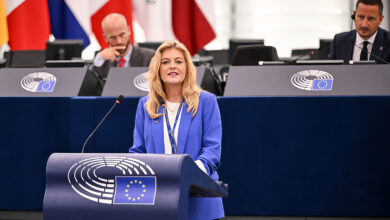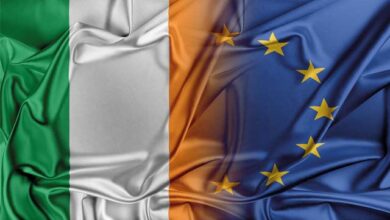Brexit: the case for special status


Since the Brexit referendum result on 23 June last year, it has been clear that the British Tory Government intends to leave the European Union and to drag the North of Ireland out with it. Sinn Féin MEP Matt Carthy writes.
Whatever the context, a Brexit of any form will inevitably create huge challenges for Ireland. Britain is, after all, our closest neighbour and largest trading partner. So, one way or another, we will have major economic, political and social problems to address.
However, all of these challenges and problems have been exacerbated by the fact that we are a partitioned island and now face the prospect of having one part of the country remaining in the EU while another is forcibly removed. This is in spite of the clearly and democratically expressed wishes of the people in that part of Ireland.
If this is allowed to happen, the only land frontier between the EU and the British State will be on the island of Ireland, running from Derry to Dundalk. Such a scenario has grave implications for the economic prosperity, trade relationships and employment across the entire island, which must be protected and enhanced together.
The effects are already being felt in terms of currency volatility and investor reluctance. Brexit also risks unravelling the political progress of the past 20 years. In the years since the Good Friday Agreement, the border has become all but invisible. Brexit seriously threatens that important progress and risks inflicting significant hardship on border communities and the wider economy and society.
The very last thing we need to experience is the re-emergence of border controls, customs posts and all the paraphernalia of partition which had been banished with the peace process. There is a real and deepening concern now, right across the border region, as to how Brexit will impact on businesses, tourism and on people who cross the border on a daily basis for work and education.
The uncertainty, which is already damaging trade and investment and impacting on cross-border business, will be as nothing compared to the hardships which will ensue following the imposition of tariffs and the restriction of the free movement of goods, services and people on this island.
New restrictions on cross-border agricultural trade would also be a devastating development for farmers, particularly in border counties. Farming communities, North and South, have always worked together and that is the way things must continue into the future if there is any prospect of protecting the Irish family farm network as we know it.
Citizen access to the nearest medical care or ambulance service may be disrupted by of a strengthening of the border and, as a result, the lives of border residents may be put at risk. There is £1.2 billion worth of trade carried out between the North and the South of Ireland each week and an estimated 200,000 jobs are dependent on this. With one part of the island operating within the EU and another part outside it, all of this is at risk.
As the people of the North voted to remain in the EU, the Irish Government must work in the best interests of Irish citizens and ensure designated special status for the North within the EU. This position can be realised, and has the consent of a 56 per cent cross-community majority in the North – democratically expressed – who voted to remain.
Alongside the peace process, Sinn Féin wants to protect the constitutional and institutional arrangements of the Good Friday Agreement. The fact that, under international law, all people of the North are entitled to Irish citizenship, which makes them de facto EU citizens, means that this demand should go beyond our party and should be central to the Irish government and the European institutions.

Our priorities for the North include:
- a continuation of unfettered access to EU single market and customs union;
- the retention of the Common Travel Area and an absence of border controls or EU frontier on the island;
the maintenance of all EU funding streams; - protection of EU access to employment, social security and healthcare;
- a safeguarding of workers’ rights and conditions, including health and safety, working hours, maternity/paternity leave and contracts; and
- a commitment to playing our part in protecting the global environment – climate change and environmental protection are huge challenges.
Realising these objectives are not just important for the North; they are vital for the entire island. There is therefore an obligation on the Irish and British Governments, all political parties and the European Union to seriously explore all options of how the North can remain, including securing designated special status within the EU.
What is required is the political will on behalf of the EU 27 during negotiations, of which the Irish State is one member. They must therefore work to persuade the other member states of the merits of the case for the North to be allocated special status.
Sinn Féin has publicly established the case for this status and has been on a diplomatic offensive with the EU member states in Dublin, London and Brussels for the past number of months. This continues. With the British Government’s triggering of Article 50 only weeks away, Sinn Féin has repeatedly called on the Taoiseach and the Government to agree upon a strategic approach to the negotiations with clear political and economic and trade objectives that protect the interests of all citizens on the island of Ireland, defend the Good Friday Agreement, and ensure that a frontier between the EU and Britain does not materialise on the island of Ireland.
This means upholding the democratic vote in the North to remain. It also requires the Government, who are at the negotiating table, to actively campaign for the North to have a special designated status within the EU, and act in the national interests of the whole island. As a matter of urgency, the Government needs to publish a White Paper setting out its strategy and objectives in the Brexit negotiations.
Brexit is bad news for Ireland, both North and South, but it also necessitates a wider discussion about future constitutional and political arrangements on the island. The British Government’s insistence that it will impose Brexit on the North against the democratic wishes of the majority there, has highlighted the fundamentally undemocratic nature of the Partition. The Brexit referendum result has swept away many of the previous political assumptions about the constitutional status quo. Ireland’s political landscape has been transformed dramatically.
It is now vitally important in the immediate period ahead that there is maximum co-operation to uphold the democratic wishes of the people of the North and to mitigate the effects of Brexit on the island as a whole. To many, of course, it serves to emphatically reinforce our position that the best way to ensure this is through the unification of the island of Ireland.





